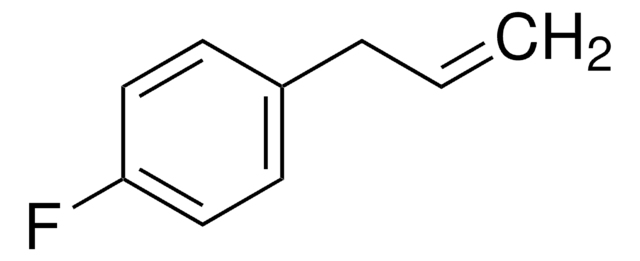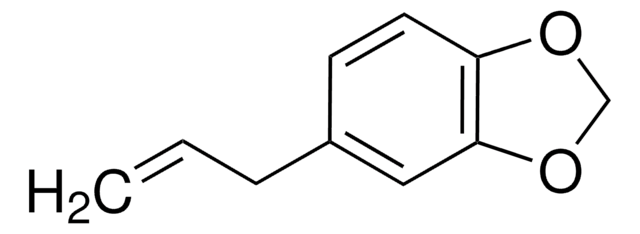706728
4-Allyltoluene
97%
Synonym(s):
1-Allyl-4-methylbenzene
Sign Into View Organizational & Contract Pricing
All Photos(1)
About This Item
Empirical Formula (Hill Notation):
C10H12
CAS Number:
Molecular Weight:
132.20
EC Number:
MDL number:
UNSPSC Code:
12352100
PubChem Substance ID:
NACRES:
NA.22
Recommended Products
Assay
97%
form
liquid
refractive index
n20/D 1.509
density
0.865 g/mL at 25 °C
SMILES string
Cc1ccc(CC=C)cc1
InChI
1S/C10H12/c1-3-4-10-7-5-9(2)6-8-10/h3,5-8H,1,4H2,2H3
InChI key
WAEOXIOXMKNFLQ-UHFFFAOYSA-N
Signal Word
Warning
Hazard Statements
Precautionary Statements
Hazard Classifications
Acute Tox. 4 Oral - Flam. Liq. 3
Storage Class Code
3 - Flammable liquids
WGK
WGK 3
Flash Point(F)
129.9 °F
Flash Point(C)
54.4 °C
Personal Protective Equipment
dust mask type N95 (US), Eyeshields, Gloves
Certificates of Analysis (COA)
Search for Certificates of Analysis (COA) by entering the products Lot/Batch Number. Lot and Batch Numbers can be found on a product’s label following the words ‘Lot’ or ‘Batch’.
Already Own This Product?
Find documentation for the products that you have recently purchased in the Document Library.
Customers Also Viewed
T Ishida et al.
Enantiomer, 3(2), 133-147 (1998-10-23)
Thirteen kinds of aromatic compounds (Alkyl- and alkenyl-) were administered to rabbits and the chiralities of their optical active metabolite were determined by the synthesis of the enantiomers or their derivatives. This work has revealed many examples of enantioselective biotransformations
T Matsumoto et al.
Biological & pharmaceutical bulletin, 17(11), 1441-1445 (1994-11-01)
4-Isopropenyltoluene (8) was administered orally to rabbits and the following four optically active metabolites, 2-(p-tolyl)propanoic acid (10), p-(1-carboxyethyl)benzoic acid (11), 2-hydroxy-2-(p-tolyl)propanoic acid (12), and 2-(p-tolyl)-1,2-propanediol (13) were isolated from urine in addition to an optically inactive metabolite, 4-isopropenylbenzoic acid (9).
Nurhayat Tabanca et al.
Molecules (Basel, Switzerland), 24(13) (2019-07-03)
Ceratitis capitata, the Mediterranean fruit fly, is one of the most serious agricultural pests worldwide responsible for significant reduction in fruit and vegetable yields. Eradication is expensive and often not feasible. Current control methods include the application of conventional insecticides
Our team of scientists has experience in all areas of research including Life Science, Material Science, Chemical Synthesis, Chromatography, Analytical and many others.
Contact Technical Service










